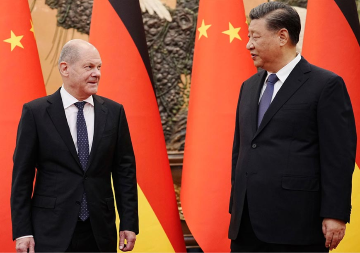
Current initiatives on (re)drafting a legally binding ban on the placement of weapons in outer space or the commencement of new discussions on reducing space threats through responsible behaviours, outline a broader concern on global stability. Both commercial value and social benefits created by the space industry are additional incentives for the protection of space systems and future operations. However, some of these assets could be seen as a threat to other States, and, therefore, become a target of choice due to their strategic importance, provoking escalations that may promote a dangerous arms race.
The deployment of potentially disruptive systems and strategies through new types of space operations is an ongoing concern across the globe—sometimes intensifying, sometimes diminishing. It is possible to be overwhelmed by the new and emerging ways of operating in space. Rendezvous and proximity operations, the creation of space forces, the launch of thousands of satellites by a single operator, the unveiling of classified ‘space weapons’ or disruptive technologies, or the split of a single space object into two different capabilities and hence assets, to name a few, tend to jeopardise diplomatic discussions and provoke a rise in tension.
The deployment of potentially disruptive systems and strategies through new types of space operations is an ongoing concern across the globe—sometimes intensifying, sometimes diminishing.
Although space security has been an important part of discussions at the Conference on Disarmament (CD) over the past 40 years, recent moves indicate an increase in distrust between spacefaring nations. There is a need to investigate new initiatives linked to space security and strategic defence, based on existing legal framework applicable to space activities.
Building space norms in times of tension is not new, but it is interesting to note that the number of States involved in preliminary discussions, as well as the number of topics addressed in said discussions, were far fewer at the time of drafting the Outer Space Treaty. In 1967, the negotiating parties agreed on adopting a treaty which immediately became the central pillar of international space law, with subsequent adherence by other States. Over the years, the number of stakeholders involved in the negotiations increased. The 1967 Outer Space Treaty not only became the ‘one space treaty to rule them all’ as a compendium of principles complying with the UN Charter and establishing common understanding and visions on space use and exploration, but also the starting point for regulating space activities.
This process demonstrated the capacity of States to reach compromises and develop strong, legally-binding instruments to resolve specific issues raised by the emergence of innovative space activities. However, the recent multiplication of space actors, whether States or non-government entities, as well as assets and activities, became a game-changer for law- and policy-makers.
The 1967 Outer Space Treaty not only became the ‘one space treaty to rule them all’ as a compendium of principles complying with the UN Charter and establishing common understanding and visions on space use and exploration, but also the starting point for regulating space activities.
Multiplication of space actors and its impact on space policy
Diversity of perspectives can refocus the debate to those issues that are most important for all stakeholders: Protecting the space environment or safeguarding space infrastructure, amongst other interests. The space industry is essential not only for military and strategic interests but also for humanitarian, governmental, and economic purposes. These contributions to international efforts towards peace and security in outer space are essential to harness the benefits of space systems, keeping in mind that nowadays, “sustainability and security two sides of the same coin,” and both safety and security are deeply interrelated.
Observers recently recentred the debate on a particular aspect of space security, namely anti-satellite (ASAT) technologies. The destruction of assets placed in outer space is high on the list of issues they identify as most pressing and requiring immediate action. As a result, some researchers and experts rolled out propositions to advance a transparent and cooperative approach, promoting the cessation of destructive operations in both outer space and launched from the ground. One approach was the development of ASAT Test Guidelines, first initiated in 2013 by a Group of Governmental Experts on Outer Space Transparency and Confidence-Building Measures. Another is through general calls to ban anti-satellite tests, to not only build a more comprehensive arms control regime for outer space and prevent the production of debris, but also reduce threats to space security and regulate destabilising force. Many space community members threw their support behind a letter urging the United Nations (UN) General Assembly to take up for consideration a kinetic anti-satellite (ASAT) Test Ban Treaty for maintaining safe access to Earth orbit and decreasing concerns about collisions and the proliferation of space debris. An important highlight is the recent proposition by a former diplomat for an optional protocol to the Outer Space Treaty, extending its existing ban on weapons of mass destruction to all forms of weapons. All of these initiatives are focusing on the source of the threats and seem to fall under space security issues. However, the target of the threats may be civilian space infrastructure and the consequences in case of disruption will spread to all the stakeholders and not be limited to military assets and actors. These concerns are subjects of discussion amongst UN member states at the CD.
Some researchers and experts rolled out propositions to advance a transparent and cooperative approach, promoting the cessation of destructive operations in both outer space and launched from the ground.
Space policy and multilateralism
At the UN level, some States have promoted creation of new binding norms and voluntary measures, linked to both behaviours and space technologies. Attracted by the increasing importance of the space domain for commercial, political, and strategic reasons, diplomats are working on adapting existing laws and policies to the current practice of space activities.
On 7 December 2020, the UN General Assembly (UNGA) adopted Resolution 75/36 ‘on reducing space threats through norms, rules and principles of responsible behaviours’, a new initiative laying the foundation for a discussion to identify responsible behaviour in outer space. Adopting a bottom-up approach, Resolution 75/36 aims to lessen tensions and reduce incentives for a space-based arms race. This resulted in the publication of a report by the UN Secretary-General on the reduction of space threats, with the support of the UN Office for Disarmament Affairs. Resolution 75/36 paves the way for a broad engagement by States on the matter of characterising responsible, irresponsible, and threatening behaviour in outer space. As a result, the UN member states, the European Union, and non-governmental organisations submitted their views for inclusion in the report. The report underlines the central role of the UN to the further development of the regime governing outer space. Whether the UNGA will decide to consider the concerns related to ASAT tests or just ignore and focus on broader questions remains to be seen.
In parallel to this development, one of the latest multilateral initiatives is the renewed proposal for a legally binding instrument announced in April 2021 by the Minister of Foreign Affairs of the Russian Federation. The draft Treaty on the Prevention of the Placement of Weapons in Outer Space (PPWT) was initially proposed in 2008 and a revised text was submitted in 2014. The initial proposal came only one year after the test of anti-satellite missiles, which promoted space safety to the forefront of major space powers’ and the United Nations’ agendas. Sponsored by China and Russia, this instrument aims to prohibit the placement of weapons in outer space, a wording criticised by observers who consider that the more significant threat would come from the ground and not from outer space.
One of the latest multilateral initiatives is the renewed proposal for a legally binding instrument announced in April 2021 by the Minister of Foreign Affairs of the Russian Federation. The draft Treaty on the Prevention of the Placement of Weapons in Outer Space (PPWT) was initially proposed in 2008 and a revised text was submitted in 2014.
The threats and risks mentioned, and public declarations on unveiling potential ‘weapons’, regularly refresh these discussions. This causes a rise in tensions, and even sometimes an escalation in the form of offensive or defensive space security technology development. China and Russia are working on a multilateral instrument and are calling for other members of the CD to be a part of negotiations. Some observers are questioning the success of such an enterprise, whereas others consider it as a “good starting point”. Multilateralism seems to be China and Russia's top priorities, calling for member states to participate and welcome them to join early negotiations.
If the spacefaring States' ambitions to fix the loophole in the current legal system are honourable, the multiplication of divergent initiatives is a double-edged sword of political will. However, lessons learnt from decades of negotiations show that involving additional voices and introducing new topics in the discussions could result in complementary initiatives that could provide a better encapsulation of the issues at stake.
The views expressed above belong to the author(s). ORF research and analyses now available on Telegram! Click here to access our curated content — blogs, longforms and interviews.




 PREV
PREV


